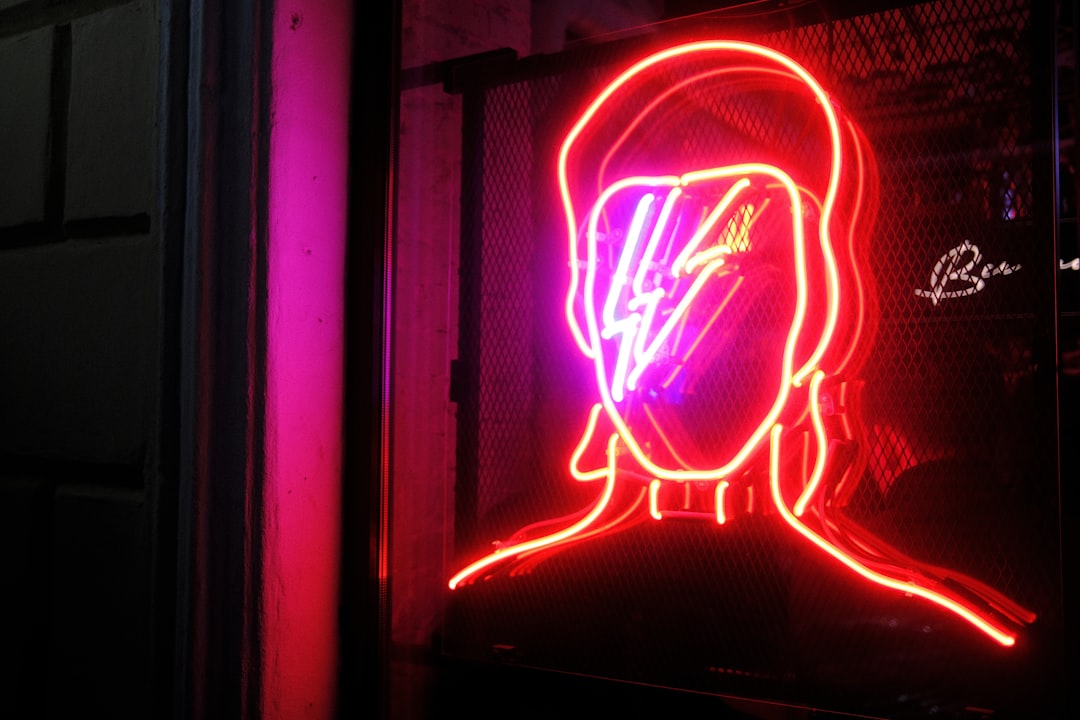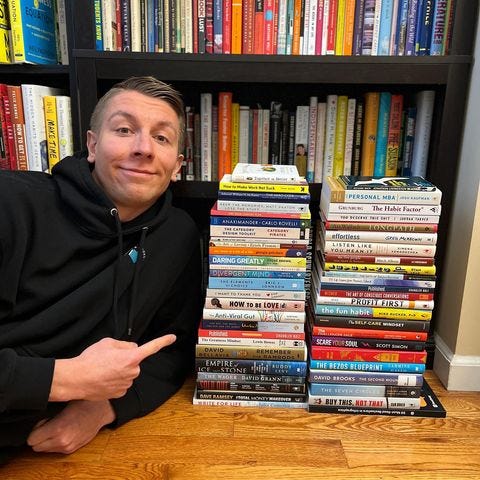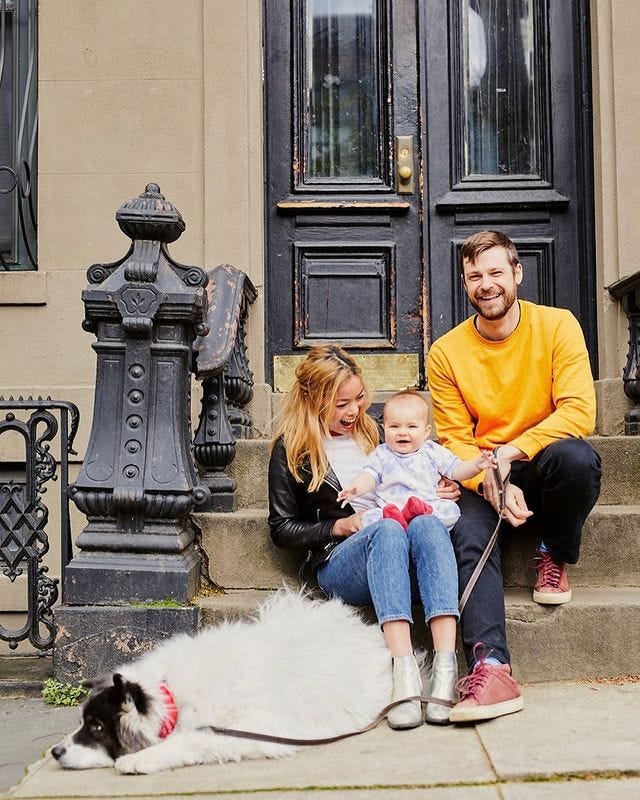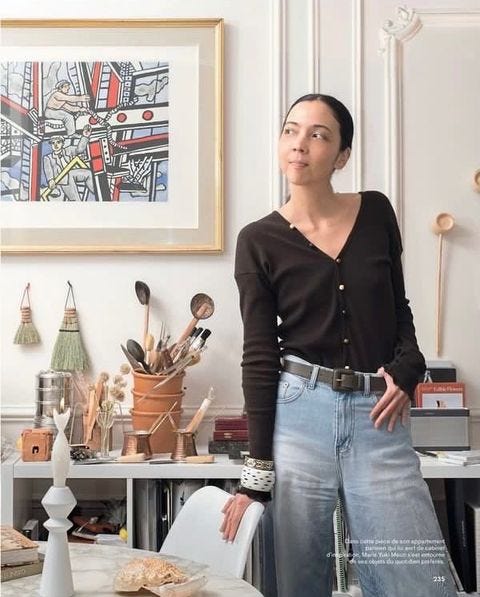The Saturday Brunch: a figurative flat white or fizzy to start your weekend

A couple weeks ago, I took a look at three Inspirational Creatives: Violette, Lizzo, and David Bowie. Now, I’m adding three more to the mix: a professional reader, a freelance writer (also on staff at The New Yorker), and a chef.
Let us know of others who get you thinking about how creativity fits into your life and how to make it a ‘success’…whatever that means to you.
I’ll also share the beginnings of my next project: Yoga & Writing, a community and podcast. Writers reading this publication might be interested in areas like my approaches to creativity, mental strength, and posture (or writing related injury, yes I’ve had one!!) as well as more philosophical essays from cultural perspectives like a few I’ve published here (Writing Toward Immortality / Meditation for Writing).
If you’re curious, sign up here to join the community. I aim to make it a supportive and fun space, but with lots of deep thinking, of course!
“Alex and Books”
Alex and Books is a newsletter, podcast, reading course with nearly a million followers…Alex Wieckowski has made a whole brand out of reading. One may think — how? doesn’t everyone learn that in school anyway? His success is especially surprising because he claims to have not been a reader at all just four years ago. His discovery of reading as an adult and goal oriented work toward learning the best ways to get something from his reading have turned into a business.
I think that in many ways, his project has succeeded because it is so personal and passionate. It’s also relatable to many readers or listeners who are interested in reading once school is over but don’t really know where to begin. Here, he discusses how a bike injury led him to read again. (He also talks about a slew of “bad English teachers”…yikes.)
I found this podcast that ‘Alex and Books’ did with Andrew Barry to be illuminating.
I think he’s got a great approach to reading now, but more than that, I’m inspired by the way he talks about his work as an entrepreneur and how being patient and doing work you truly believe in rather than ‘selling out’ can lead to success. In other words, if you’re creating content online, don’t just go for the most views or engagement, go for what you think is good or for what makes you feel more fulfilled as you produce it. It’s definitely worth a listen if you are growing any kind of audience online.
Takeaway: only do work you believe in and don’t be afraid to do something you’ve only just discovered.
Jia Tolentino
Jia Tolentino is a staff writer at The New Yorker, freelance writer, and author of The Trick Mirror: reflections on self-delusion. Formerly, she was the deputy editor of Jezebel and a contributing editor at the Hairpin. If you haven’t encountered her work, you can check out her writing on the topics of abortion, scrolling, Taylor Swift, or Shark Tank.
There have been some great interviews with Tolentino in the last few years due to the release of her book in 2019, such as for The Paris Review (“Please Fire Jia Tolentino”), The Creative Independent (“Creating for the Sake of Creating”), and Vogue (“Jia Tolentino on success, the perils of modern journalism, and writing whatever she wants”). The interviews expose fiery persona, not afraid of taking risks, but also someone deeply critical of her own work. She claims it’s what propels her to keep going: “it is the job of a writer to be dissatisfied with everything they do.”
Maybe this confident yet dissatisfied type of writing allows one to reinvent. If you think your work is “amazing,” well, you might just stop. How could it improve? Why keep moving forward? In a way, it’s also allowing yourself to be satisfied with the dissatisfaction—to publish something you know isn’t perfect.
The book of essays allowed Tolentino to move into different territories of expression. She tells The Paris Review why she wrote the book:
None of the things I wrote for the book were things I had considered trying to write for The New Yorker because these were things that I wanted to write exactly the way I wanted. I wanted the essays to be five to seven thousand words each—they ended up being around ten thousand—but I knew I wanted to write essays that were a little too long, that were coming at things from all these different angles. And none of them would make sense at all as New Yorker pieces, really.
Tolentino also goes on to explain that each essay allowed her to learn something new, in the act of writing it. I often feel this way: that writing is not a reflection of what I have discovered but is instead an act of discovery in itself.
As a writer, success can mean so many things. The definition might change if you make writing your full time profession. But at the heart of it, either way, one is likely trying to gain the freedom to write what they want. If you need money to have the space and time to write, then money is part of the success. Even if you don’t, ‘freedom’ might look like surrendering yourself to the creative process and moving your ego to the side.
Tolentino talks about her own success in this way:
I think I’ve had success beyond what I had hoped for. To me, that means having the freedom to not be on Twitter. Having the freedom to detach from the many mechanisms of personality capitalism that I wrote about in the first chapter of the book. Ideally, I want my work to get harder but I want to have more time to do it, and obviously being paid more means having more time. Success is freedom. And basically being able to write what you want.
In her success, she’s been pushing the boundaries of genre and pace. She decides if she wants more time with her family. She is working on a screenplay. I’m excited to see what directions this takes her in.
Takeaways: write to learn; never being completely satisfied with one’s work allows one to continue creating and publishing.
Marie Méon
I find that a lot of chefs inspire me for the way they blend culture, art, and simply good taste into one plate. You can philosophize food forever. I’ve just started reading another food book: Stanley Tucci’s Taste: My Life through Food.
Marie Méon is a fascinating young contemporary chef who not only plays with her own mixed cultures but also with the fashion industry.
The Japanese-French chef works with fashion greats like Hermès and Cartier, and previously for Dior and Chanel as a retail designer. Her company - Manger Manger - is a “multidisciplinary platform where food and ingredients are thought of as creative tools.”
Her start with fashion professionally and cooking on the side helped her design the new venture. Like many artists, her work was at first unpaid and just for friends, allowing her to experiment a little more freely. As she states on her website, while working in fashion:
In parallel, she never puts aside her appetite for cooking: from 2010 to 2012 she opens several times a month the doors of her Haussmannian apartment to offer « clandestine » dinners. The concept is simple: 30 guests, a unique menu inspired by the seasons, her travels and encounters. The project quickly meets success.
Eventually this turned into her “multidisciplinary” work rather than choosing one passion over the other. The collaborations seem to make her work fresher as she states in this interview with the FT:
“I used to think: space, colours and finishes in my previous work. Today, my tools are ingredients — that’s the only difference,” she says. “All these fashion decision makers see that food is maybe the greatest method of communication. Nothing is more powerful than putting people together and having them share a polysensorial moment.”
Méon seems to highlight both that food can be seen as fashion and that fashion can be tasted (& even smelled?) like food.
Takeaway: allow different parts of yourself to merge into your profession, even if nobody’s done it before.
These two weeks are just a sampling of people I find inspirational, connected to messages we can learn from.
Honorable mentions to Inua Ellams, Raphan Kebe, Taylor Swift, Julia Child, Jessica Olie, Chuck Palahniuk, Yayoi Kusama, and a bunch more, including several wonderful writers I’ve encountered on this platform. All for different reasons!
Finally, if channeling authenticity is what you’re after, check out this take on Rihanna’s Super Bowl performance from Yoga Journal.
Who else inspires you? Where are you looking for inspiration in your creative life?










Great post! Totally agree with the sentiment that you must do creative work that you believe in, even if that's just for the sake of doing it. I think passion comes across in any creative art form, and it is this that will make you stand out and appeal to an "audience". Thank you for sharing these three different creatives and perspectives : )
Really good selection 👌
"In a way, it’s also allowing yourself to be satisfied with the dissatisfaction—to publish something you know isn’t perfect."
As an amateur/new/bumbling-along-finding-my-way writer, this is something that feels good to read, especially when related to having a Substack. I get fidgety sometimes trying to second guess what I should post and whether it's good enough, but I love this sentiment of being satisfied with dissatisfaction. That there's always something further to reach towards.